If you love spending time outside, don’t let the cold weather put a damper on your outdoor activities. With a patio heater, you can stay warm and cozy even in the winter months. In this article, we’ll cover everything you need to know about patio heaters in winter, including how they work, different types available, benefits of using them, and tips for using them safely.
Patio Heaters in Winter: What You Need to Know
- Learn about the different types of patio heaters
- Discover the benefits of using patio heaters in winter
- Find out how to choose a patio heater and use it safely.
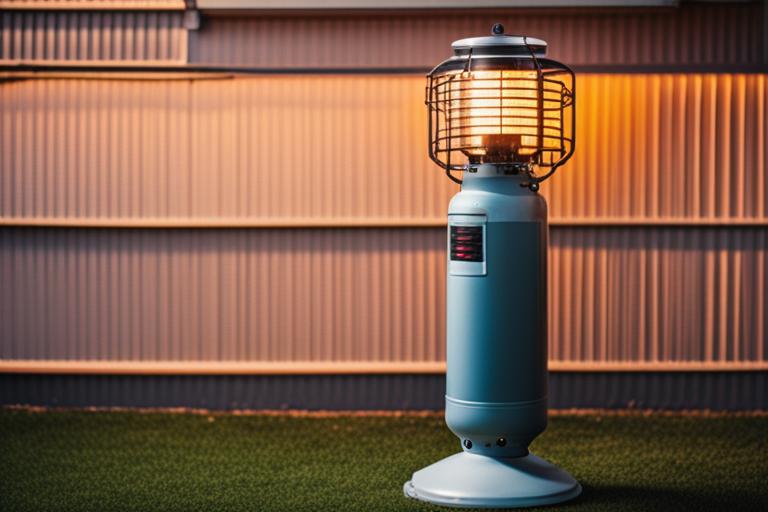
Understanding Patio Heaters
A. Definition of Patio Heaters
Patio heaters are outdoor heaters designed to provide warmth and comfort in cold weather. They are available in freestanding models or wall-mounted heaters, making them a versatile option for any outdoor space.
B. How Patio Heaters Work
Patio heaters generate heat using a fuel source or electric heating element, which is then radiated outwards. Propane and natural gas patio heaters use a burner to generate heat, which is then directed upwards to warm the air around the heater. Electric patio heaters use a heating element to generate warmth, which is then distributed through a reflector.
C. Types of Patio Heaters
There are three main types of patio heaters: propane, electric, and natural gas.
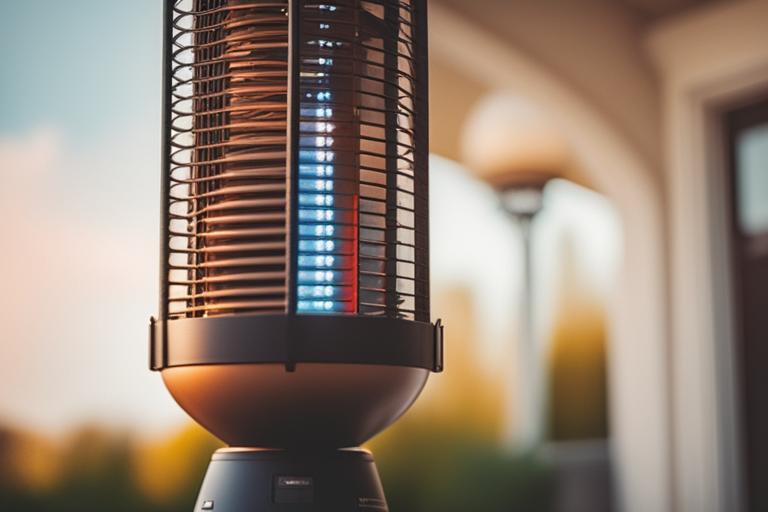
Types of Patio Heaters
A. Propane Patio Heaters
Propane patio heaters are a popular choice for outdoor heating. They are powered by propane gas, which is stored in a tank that can be easily refilled or replaced. Propane patio heaters come in various sizes and styles.
1. How They Work
Propane patio heaters use a burner to generate heat. The burner is fueled by propane gas, which is lit using an ignition switch or match. The heat is then directed upwards, warming the air around the heater.
2. Advantages
Propane patio heaters provide powerful heat and are portable, making them ideal for outdoor events or gatherings. Propane is readily available and relatively inexpensive, making it a cost-effective option for outdoor heating.
3. Disadvantages
Propane patio heaters require regular maintenance, including checking the fuel supply and cleaning the burner and reflector. They also require a propane tank, which can be bulky and heavy, making it difficult to move the heater around. Additionally, propane is not the most eco-friendly option for outdoor heating.
B. Electric Patio Heaters
Electric patio heaters are powered by electricity and come in various styles and sizes, from freestanding models to wall-mounted heaters.
1. How They Work
Electric patio heaters use a heating element to generate heat, which is then distributed through a reflector, warming the air around the heater.
2. Advantages
Electric patio heaters are easy to use and require minimal maintenance. They are eco-friendly, as they do not produce any emissions or require fossil fuels. Electric patio heaters are also relatively inexpensive to operate, as electricity is generally less expensive than propane or natural gas.
3. Disadvantages
Electric patio heaters require a power source, which can be difficult to provide in outdoor spaces. They also provide less heat than propane or natural gas heaters, which may not be sufficient for larger outdoor areas.
C. Natural Gas Patio Heaters
Natural gas patio heaters are powered by natural gas, which is supplied through a gas line connected to the home or building. Natural gas patio heaters come in various styles and sizes.
1. How They Work
Natural gas patio heaters use a burner to generate heat. The burner is fueled by natural gas, which is supplied through a gas line connected to the home or building. The heat is then directed upwards, warming the air around the heater.
2. Advantages
Natural gas patio heaters provide powerful heat and are eco-friendly, as natural gas is a cleaner burning fuel than propane. Natural gas patio heaters are also convenient, as they do not require a separate fuel tank and can be connected directly to the home or building’s gas line.
3. Disadvantages
Natural gas patio heaters require a gas line connection, which can be costly to install. They also require regular maintenance, including checking the fuel supply and cleaning the burner and reflector.
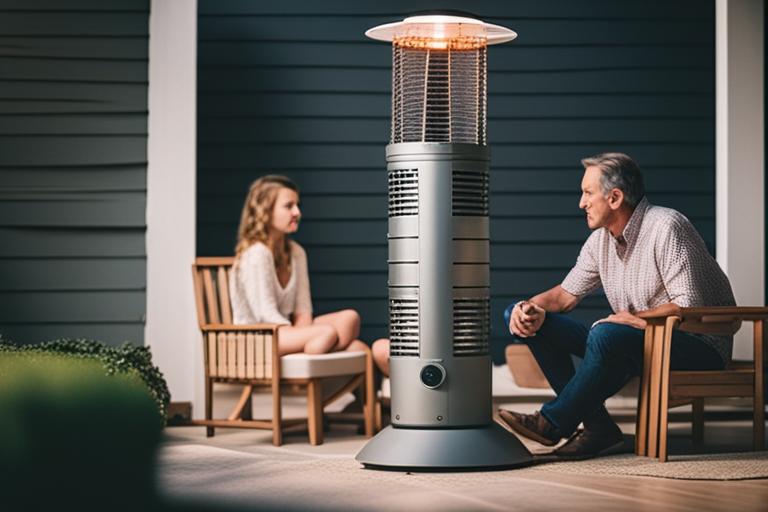
Benefits of Using Patio Heaters in Winter
A. Extended Outdoor Living Space
Patio heaters allow you to extend your outdoor living space, making it possible to enjoy your patio or outdoor space even in the coldest months.
B. Cost-Effective Heating Solution
Patio heaters are a cost-effective heating solution for outdoor spaces. They are generally less expensive to operate than traditional heating methods, such as electric or gas heaters.
C. Eco-Friendly Heating Option
Patio heaters are an eco-friendly heating option, particularly if you choose an electric or natural gas heater. They do not produce any emissions and do not require fossil fuels.
D. Increases the Value of Your Home
Investing in a patio heater can increase the value of your home. Outdoor living spaces are becoming increasingly popular, and a patio heater can make your outdoor space more functional and appealing to potential buyers.
| Factor | Propane Patio Heaters | Electric Patio Heaters | Natural Gas Patio Heaters |
|---|---|---|---|
| Size and Heating Capacity | Available in various sizes and heating capacities | Available in various sizes and heating capacities, but generally provide less heat than propane and natural gas heaters | Available in various sizes and heating capacities |
| Fuel Source | Fueled by propane gas, which is stored in a tank that can be easily refilled or replaced | Powered by electricity | Fueled by natural gas, which is supplied through a gas line connected to the home or building |
| Mobility and Portability | Portable, making them ideal for outdoor events or gatherings | Easy to move and transport | Connected directly to the home or building’s gas line, making them less portable |
| Safety Features | Available with safety shut-off switches, tilt protection, and tip-over protection | Available with safety shut-off switches, but generally do not have tilt or tip-over protection | Available with safety shut-off switches, tilt protection, and tip-over protection |
| Design and Style | Available in various designs and styles | Available in various designs and styles | Available in various designs and styles |
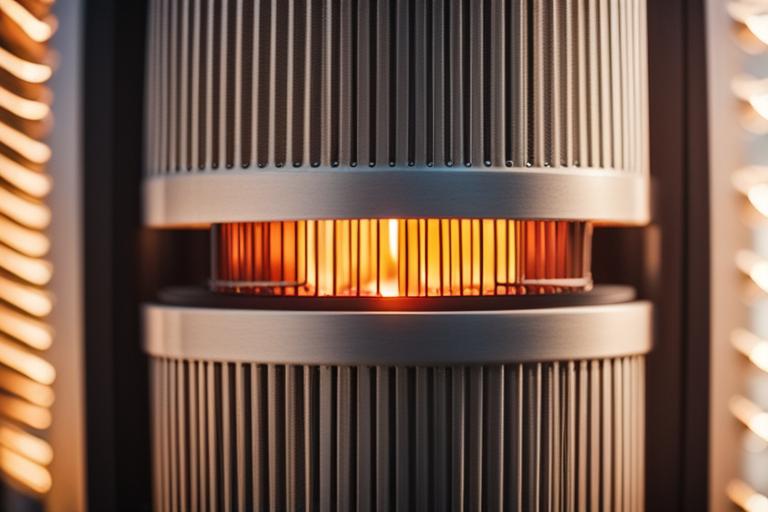
Factors to Consider When Choosing a Patio Heater
When choosing a patio heater, consider size and heating capacity, fuel source, mobility and portability, safety features, and design and style.
A. Size and Heating Capacity
The size and heating capacity of your patio heater will depend on the size of your outdoor space. Larger outdoor spaces will require larger heaters with higher heating capacities.
B. Fuel Source
The fuel source of your patio heater will depend on your preferences and the availability of fuel in your area. Propane, natural gas, and electricity are the most common fuel sources for patio heaters.
C. Mobility and Portability
If you plan to move your patio heater around your outdoor space, choose a model that is easy to move and transport.
D. Safety Features
Safety features are important when choosing a patio heater. Look for models with safety shut-off switches, tilt protection, and tip-over protection.
E. Design and Style
Patio heaters come in a variety of designs and styles, so you can choose a model that complements your outdoor décor.
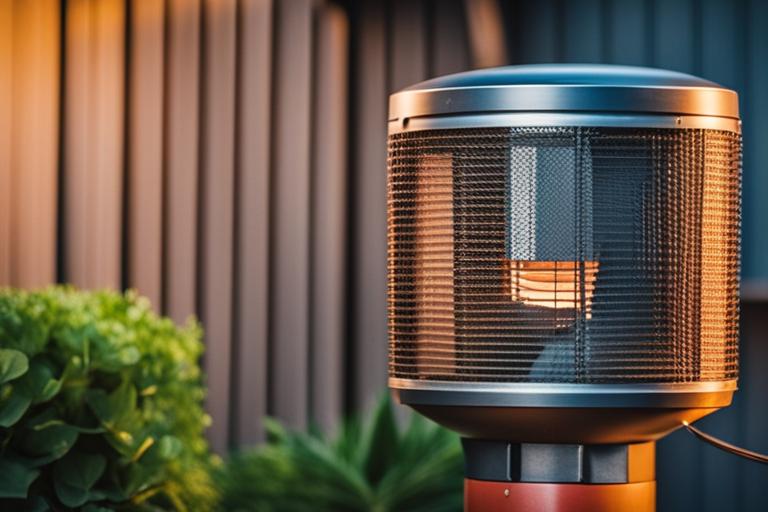
Tips for Using Patio Heaters Safely in Winter
While patio heaters are generally safe to use, take precautions to ensure safe operation.
A. Always Read the Manufacturer’s Instructions
Read and follow the manufacturer’s instructions carefully before using your patio heater.
B. Keep the Patio Heater Away from Combustible Materials
Keep your patio heater away from combustible materials such as furniture, plants, and curtains.
C. Don’t Leave the Patio Heater Unattended
Never leave your patio heater unattended while it is in use.
D. Use a Patio Heater Cover When Not in Use
Cover your patio heater with a protective cover when not in use to prevent damage from the elements.
E. Regular Maintenance and Cleaning
Regular maintenance and cleaning are important for keeping your patio heater in good working order. Check the fuel supply, clean the burner and reflector, and inspect the heater for damage on a regular basis.
Frequently Asked Questions (FAQs)
A. How Do I Maintain My Patio Heater?
Regular maintenance is important for keeping your patio heater in good working order. This includes checking the fuel supply, cleaning the burner and reflector, and inspecting the heater for damage.
B. Can Patio Heaters Be Used Indoors?
Patio heaters are designed to be used outdoors. Using a patio heater indoors can be dangerous, as they produce carbon monoxide, which can be deadly in enclosed spaces.
C. How Much Does It Cost to Run a Patio Heater?
The cost to run a patio heater will depend on the fuel source and heating capacity of the heater. Propane and natural gas heaters are generally less expensive to operate than electric heaters.
D. How Long Do Patio Heaters Last?
The lifespan of a patio heater will depend on the quality of the heater and how well it is maintained. With proper maintenance, a patio heater can last for many years.
Personal Story: Enjoying Winter Nights Outdoors
When I moved into my new house, I was excited about the large backyard and patio. I imagined myself sitting out in the sun during the summer months, but I didn’t think I would be able to use my patio during winter. However, my neighbor recommended a patio heater, and it has been a game-changer.
Last week, my family and I enjoyed a cozy winter night outside around our patio table, thanks to our propane patio heater. We grilled some burgers, sipped on hot chocolate, and played board games while the heater kept us warm. It was a great way to spend quality time together while enjoying the outdoors.
I was surprised at how easy it was to operate the patio heater. All I had to do was attach the propane tank, turn on the gas, and ignite the heater. Within minutes, the patio was warm and welcoming.
Now, I’m looking forward to hosting winter barbeques and outdoor dinner parties. I love that I can extend my living space into the outdoors and enjoy my patio year-round. I highly recommend patio heaters to anyone who wants to make the most of their outdoor space during the colder months.
Conclusion
Patio heaters are an excellent way to extend your outdoor living space and enjoy your patio all year round. By understanding how patio heaters work, the different types available, and the safety measures to take, you can choose the right patio heater for your outdoor space. Stay warm and cozy this winter with a patio heater!
Follow us!!